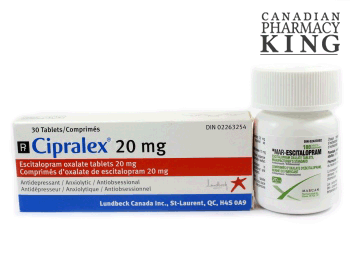
CanadianPharmacyKing.com supplies only genuine Lexapro from Canada shipped in Canadian packaging and Turkey shipped in Turkish packaging. The brand Lexapro is manufactured by Lundbeck, the worldwide manufacturer of Lexapro. This offer is neither endorsed nor authorized by Lundbeck A/S (the United States and Canadian distributor of Lexapro). CanadianPharmacyKing.com has no affiliation whatsoever with Lexapro or Lundbeck A/S.
Lexapro (Escitalopram) belongs to a group of drugs called selective serontin reuptake inhibitors (SSRIs) used to depression and anxiety in adults and treat depression in adolescents aged 12-17. It can also treat eating disorders, obsessive-compulsive disorder (OCD), generalized anxiety disorder (GAD), post-traumatic stress disorder (PTSD), and other mental/mood disorders. Escitalopram affects chemicals in the brain that may become unbalanced and cause depression and anxiety. Other antidepressant prescription medications are: Zoloft, Prozac, Wellbutrin
In a study (Development of the commercial process for Zoloft/sertraline – Wiley Online Library, 2005), George J. Quallich, found that “The successful outcome employed continuous chromatography, and the potential for this technology to shift the development paradigm for any development candidate or commercial product is described.”
Manufacturer Information
We currently have the brand Lexapro also known as Cipralex from Canada and Turkey manufactured by Lundbeck. The generic Escitalopram is also known as Marcan-Escitalopram manufactured by Marcan Pharma in Canada. We also carry the generic S Citadep is manufactured in India by Cipla. Generc Escitalopram may also comes from other countries and suppliers. Lexapro is available in the strengths of 10 mg and 20 mg tablets. Escitalopram is available in the various strengths of 5 mg, 10 mg, 15 mg, and 20 mg tablets.
Check with your doctor as soon as possible if any of the following side effects occur:
• Headache, trouble concentrating, memory problems, weakness, confusion, fainting, hallucinations,
seizure, shallow breathing or breathing that stops;
• Nausea, vomiting, diarrhea, loss of appetite, loss of coordination;
• Unusual risk-taking behaviour, feelings of extreme happiness or sadness;
• Very stiff (rigid) muscles, high fever, sweating, fast or uneven heartbeats, tremors, feeling dizzy
Common Lexapro side effects may include:
• Decreased sex drive, impotence, or difficulty having an orgasm;
• Feeling tired and drowsy;
• Increased sweating;
• Nausea, gas, heartburn, upset stomach, constipation;
• Trouble falling asleep (insomnia);
• Changes in weight
Do not take this medication if you are allergic to escitalopram, citalopram, or any ingredients of the medication. It is known that the medication citalopram, which is similar to escitalopram, passes into breast milk. If you are a breast-feeding mother and are taking escitalopram, it may affect your baby. Talk to your doctor to see if you should continue breast-feeding. There may be an interaction between escitalopram and other medications such as: alcohol, fluconazole, itraconazole, lithium, omeprazole, pimozide, quinine, tetrabenazine, tramadol, warfarin, etc. Inform your doctor if you are taking any of these medications.
Latest blog post
4 Effects of Holidays on Mental Health
Instagram Accounts to Follow for Your Mental Health
• How can I purchase Lexapro from Canada online?
You can purchase Lexapro from Canada online from www.CanadianPharmacyKing.com, or by phone, by fax, by mail or email.
• What is the average price of Lexapro?
We offer brand Lexapro 10 mg from Canada at a low cost from $3 per tablet (90 tablet at $270). The average price in the USA starts at $13.23 per tablet. It might help you save 77% or more., according to GoodRX.com
• How do I get a prescription for Lexapro?
Yes. You can get a prescription from your physician for Lexapro in the USA and use it to buy from a Canadian pharmacy.
• Are there any discounts or coupons for Lexapro?
Unfortunately, there are no discounts or coupons available for Lexapro. However, Canadian Pharmacy King is proud to offer exceptional high-quality prescription medications at an affordable price.
• Where can I find reputable Canadian pharmacies for Lexapro?
Canadian Pharmacy King is a certified member of the Canadian International Pharmacy Association (CIPA), has been a trusted and reputable online pharmacy that offers Lexapro. Fast shipping to the USA, affordable prices.
• What are the shipping costs and delivery times for Lexapro from Canada to the USA?
Our shipping cost for ordering Lexapro is $10.00 from Canada to the USA. It may take 4-8 business days for Lexapro to be delivered from Canada to the USA. If you have any questions about shipping frame, please contact our customer support at 1-877-745-9217 for details.